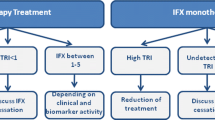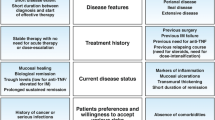Abstract
Background
Increasing the interval of administration of anti-TNF agents over the duration specified in the data sheet is not common in inflammatory bowel disease (IBD).
Aim
To evaluate the outcomes of IBD patients treated with this strategy.
Methods
Patients with IBD who were treated with infliximab or adalimumab at intervals > 8 weeks or > 2 weeks, respectively, because of persistent clinical remission, were identified at local databases of the ENEIDA registry (a nationwide registry promoted by the Spanish Working Group in Crohn’s disease and Ulcerative Colitis-GETECCU) of two referral centers. Treatment success was considered if patients remained in clinical remission with the same schedule or without biological therapy at the end of follow-up, and if no return to the conventional schedule, dose-escalation, change in biological agent, or a course of systemic corticosteroids or surgery were required.
Results
Eighty-five patients were included, 60 treated with infliximab and 25 with adalimumab. The spaced schedule was initiated after a median of 25 months on anti-TNF treatment (IQR 14–49). Throughout a median follow-up of 34 months (IQR 21–47), fifty patients (59%) fulfilled the success criteria of the spaced strategy. No differences were found regarding type of IBD or anti-TNF agent. Baseline C-reactive protein levels and disease duration at the time of starting anti-TNF treatment were the only factors associated with treatment success.
Conclusions
Anti-TNF administration at longer intervals than those provided in the data sheet may be an efficacious, convenient, and cheaper treatment option, particularly in patients in whom anti-TNF treatment was initiated early.



Similar content being viewed by others
References
Gomollón F, Dignass A, Annese V, et al. ECCO 3rd European evidence-based consensus on the diagnosis and management of Crohn’s disease: part 1: diagnosis and medical management. J Crohns Colitis. 2016;11:3–25.
Magro F, Gionchetti P, Eliakim R, et al. European Crohn’s and Colitis Organisation [ECCO]. Third European evidence-based consensus on diagnosis and management of ulcerative colitis part 1: definitions, diagnosis, extra-intestinal manifestations, pregnancy, cancer surveillance, surgery, and ileo-anal pouch disorders. J Crohns Colitis. 2017;11:649–670.
Buss NA, Henderson SJ, McFarlane M, Shenton JM, de Haan L. Monoclonal antibody therapeutics: history and future. Curr Opin Pharmacol. 2012;12:615–622.
Lemaitre M, Kirchgesner J, Rudnichi A, et al. Association between use of thiopurines or tumor necrosis factor antagonists alone or in combination and risk of lymphoma in patients with inflammatory bowel disease. JAMA. 2017;318:1679–1686.
Bonovas S, Fiorino G, Allocca M, et al. Biologic therapies and risk of infection and malignancy in patients with inflammatory bowel disease: a systematic review and network meta-analysis. Clin Gastroenterol Hepatol. 2016;14:1385–1397.e10.
Gisbert JP, Marín AC, Chaparro M. The risk of relapse after anti-TNF discontinuation in inflammatory bowel disease: systematic review and meta-analysis. Am J Gastroenterol. 2016;111:632–647.
Casanova MJ, Chaparro M, García-Sánchez V, et al. Evolution after anti-TNF discontinuation in patients with inflammatory bowel disease: a multicenter longterm follow-up study. Am J Gastroenterol. 2017;112:120–131.
Brandse JF, Vos LM, Jansen J, et al. Serum concentration of anti-TNF antibodies, adverse effects and quality of life in patients with inflammatory bowel disease in remission on maintenance treatment. J Crohns Colitis. 2015;9:973–981.
den Broeder AA, van Herwaarden N, van der Maas A, et al. Dose reduction strategy of subcutaneous TNF inhibitors in rheumatoid arthritis: design of a pragmatic randomised non inferiority trial, the DRESS study. BMC Musculoskelet Disord. 2013;14:299.
van der Maas A, Kievit W, van den Bemt BJ, van den Hoogen FH, van Riel PL, den Broeder AA. Down-titration and discontinuation of infliximab in rheumatoid arthritis patients with stable low disease activity and stable treatment: an observational cohort study. Ann Rheum Dis. 2012;71:1849–1854.
Mörck B, Pullerits R, Geijer M, Bremell T, Forsblad-d’Elia H. Infliximab dose reduction sustains the clinical treatment effect in active HLA B27 positive ankylosing spondylitis: a two-year pilot study. Mediators Inflamm. 2013;2013:289845.
Van Steenbergen S, Bian S, Vermeire S, Van Assche G, Gils A, Ferrante M. Dose de-escalation to adalimumab 40 mg every 3 weeks in patients with Crohn’s disease—a nested case–control study. Aliment Pharmacol Ther. 2017;45:923–932.
Papamichael K, Karatzas P, Mantzaris GJ. De-escalation of infliximab maintenance therapy from 8- to 10-week dosing interval based on faecal calprotectin in patients with Crohn’s disease. J Crohns Colitis. 2016;10:371–372.
Pouillon L, Lamoureux A, Pineton de Chambrun G, et al. Dose de-escalation to adalimumab 40 mg every three weeks in patients with inflammatory bowel disease—a multicenter, retrospective, observational study. Dig Liver Dis. 2019;51:236–241.
Kugathasan S, Werlin SL, Martinez A, Rivera MT, Heikenen JB, Binion DG. Prolonged duration of response to infliximab in early but not late pediatric Crohn’s disease. Am J Gastroenterol. 2000;95:3189–3194.
D’Haens G, Baert F, van Assche G, et al. Early combined immunosuppression or conventional management in patients with newly diagnosed Crohn’s disease: an open randomised trial. Lancet. 2008;371:660–667.
Vande Casteele N, Ferrante M, Van Assche G, et al. Trough concentrations of infliximab guide dosing for patients with inflammatory bowel disease. Gastroenterology. 2015;148:1320–1329.e3.
Ben-Horin S, Chowers Y, Ungar B, et al. Undetectable anti-TNF drug levels in patients with long-term remission predict successful drug withdrawal. Aliment Pharmacol Ther. 2015;42:356–364.
Louis E, Mary JY, Vernier-Massouille G, Groupe D’etudes Thérapeutiques Des Affections Inflammatoires Digestives, et al. Maintenance of remission among patients with Crohn’s disease on antimetabolite therapy after infliximab therapy is stopped. Gastroenterology. 2012;142:63–70.e5. (quiz e31).
Tweehuysen L, van den Ende CH, Beeren FM, Been EM, van den Hoogen FH, den Broeder AA. Little evidence for usefulness of biomarkers for predicting successful dose reduction or discontinuation of a biologic agent in rheumatoid arthritis: a systematic review. Arthritis Rheumatol. 2017;69:301–308.
Acknowledgments
PT received a research grant from the Fundació Catalunya La Pedrera.
Funding
No funding was received specifically for this study.
Author information
Authors and Affiliations
Corresponding author
Ethics declarations
Conflicts of interest
Laura Núñez has received educational grants from Janssen; Míriam Mañosa has served as a speaker and has received research or educational funding from MSD, AbbVie, Takeda, Janssen, Ferring, and Pfizer; Francisco Mesonero has served as a speaker for Janssen, MSD, Takeda y Abbvie; Fiorella Cañete has served as a speaker or has received educational grants from Takeda, Janssen, MSD, and Ferring; Margalida Calafat has served as a speaker for Takeda, Janssen, Faes Farma and MSD; Antonio López-Sanromán has served as a speaker, a consultant and an advisory member for or has received research funding from MSD, Abbvie, Pfizer, Takeda, Janssen, Ferring, Faes Farma, Shire Pharmaceuticals, Dr. Falk Pharma, Tillotts Pharma, Chiesi, Gebro Pharma, and Vifor Pharma; Eugeni Domènech has served as a speaker or has received research or educational funding or advisory fees from MSD, AbbVie, Takeda, Kern Pharma, Pfizer, Janssen, Celgene, Adacyte Therapeutics, Otsuka Pharmaceuticals, Ferring, Shire Pharmaceuticals, Tillots Pharma, Thermofisher, Grifols, and Gebro. The remaining authors declared no conflicts of interest.
Informed consent
This is a retrospective study based on the local databases of the ENEIDA registry (a nationwide registry of IBD patients promoted by the Spanish Working Group in Crohn’s disease and Ulcerative Colitis-GETECCU). The registry was approved by the Ethics Committees at both centers, and all patients gave their informed consent.
Additional information
Publisher's Note
Springer Nature remains neutral with regard to jurisdictional claims in published maps and institutional affiliations.
Rights and permissions
About this article
Cite this article
Torres, P., Cañete, F., Núñez, L. et al. Spacing the Administration Interval of Anti-TNF Agents: A Valid Strategy for Patients with Inflammatory Bowel Disease?. Dig Dis Sci 65, 2036–2043 (2020). https://doi.org/10.1007/s10620-019-06010-w
Received:
Accepted:
Published:
Issue Date:
DOI: https://doi.org/10.1007/s10620-019-06010-w




